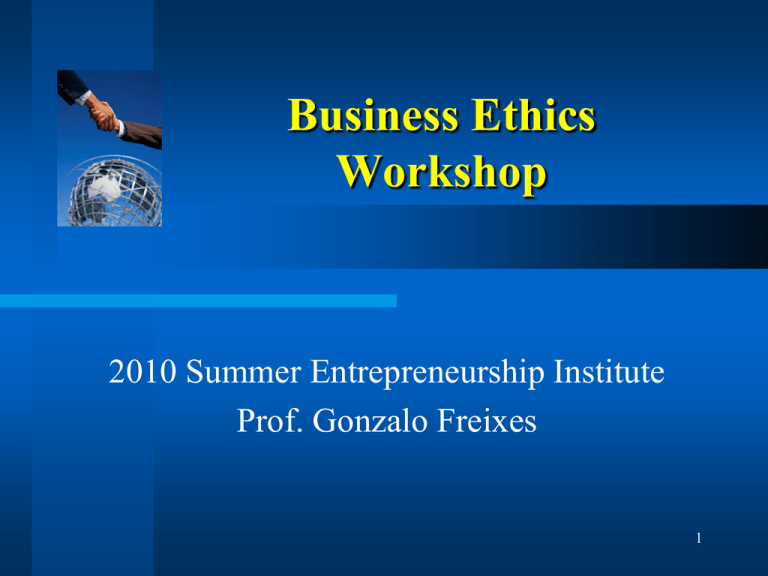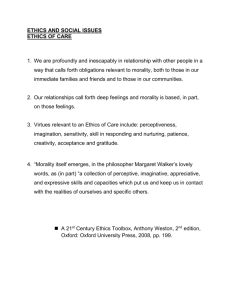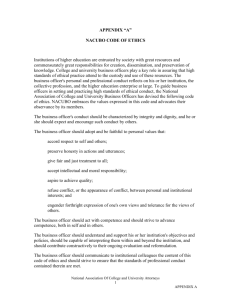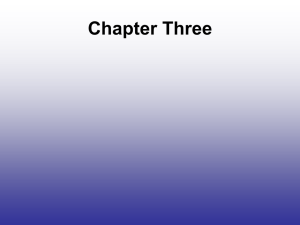Ethics-Workshop-2010
advertisement

Business Ethics Workshop 2010 Summer Entrepreneurship Institute Prof. Gonzalo Freixes 1 What is Ethics? "Art, like morality, consists of drawing the line somewhere." — G.K. Chesterton, English essayist and poet (1874-1936) “Ethics is a code of values which guide our choices and actions and determine the purpose and course of our lives.” — Ayn Rand, Russian-American novelist/philosopher (1905-1982) 2 Who is an Ethical Person? "A moral being is one who is capable of comparing his past and future actions or motives, and of approving or disapproving of them." — Charles Darwin, English biologist (1809-1882) 3 Theory of Moral Development (Lawrence Kohlberg) Level One: Pre-Conventional Morality Level Two: Conventional Morality Level Three: Post-Conventional Morality Stage 1: Punishment - Obedience Orientation Stage 2: Instrumental Relativist Orientation Stage 3: Good Boy - Good Girl Orientation Stage 4: Law and Order Orientation Stage 5: Social Contract Orientation Stage 6: Universal Ethical Principle Orientation 4 Character Counts Six Pillars of Character Trustworthiness Respect Responsibility Fairness Caring Citizenship - Michael Josephson, Josephson Institute of Ethics 5 Professional Ethics Impartiality & Objectivity Openness, Full Disclosure Due diligence, Duty of Care Fidelity to Professional Responsibilities Avoiding Conflicts of Interest (Actual, Potential or Apparent) 6 All the Wrong Reasons “Everybody does it.” “If we don’t, someone else will.” “The only thing that matters is the bottom line!” “It doesn’t really hurt anyone.” “We’ll wait until the lawyers tell us it’s wrong.” “I was just following orders.” 7 7 Steps to Better Decisions An Ethical Approach to Business 1. 2. 3. 4. 5. 6. 7. Stop & Think Clarify Goals Determine Facts Develop Options Consider the Consequences Choose Wisely Monitor & Modify 8 Corporate Responsibility What is the purpose of a corporation? Monotonic View vs. Pluralistic View Corporate Constituency Statutes Dolphins & Baby Formula (the case of Star Kist & Nestle) 9 Agents & Fiduciaries Principal Agent relationship Agent has fiduciary duties Loyalty Performance To Obey A can be liable to P or 3rd Parties 10 Fiduciary Duties - Loyalty Stealing Secrets Conflicts Commingling 11 Fiduciary Duties - Performance Care & Skill Reputation Disclose & Notify Account Stay in Scope 12 Fiduciary Duties - Obey Obey your Principal, unless… Illegal Immoral 13 Principal’s Duties to Agent Opportunity to Work Compensation Indemnity Cooperation 14 Corporate Executives Duty of Care Act as a reasonable executive would Protected by Business Judgment Rule Informed decision Rational basis No conflict Protected by Constituency Statutes 15 Corporate Executives Duty of Loyalty 1. Avoid Self Dealing 2. Avoid Common Directorships 3. Avoid seizing Corporate Opportunities 16 Ethics in Global Business Results of International Study 1. Personal Standards: EU 2. Interpersonal Standards (e.g. Loyalty): Japan 3. Organizational Standards: US MNC’s deal with ethics “ad hoc” viewed as “public relations” issue 17 SARBANES-OXLEY ACT OF 2002 PUBLIC ACCOUNTING OVERSIGHT BOARD (PCAOB) AUDITOR INDEPENDENCE EXECUTIVE RESPONSIBILITY FINANCIAL/ETHICAL DISCLOSURES 18







